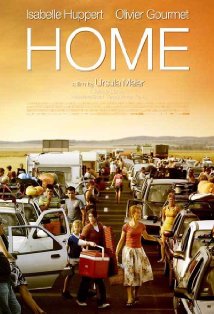Plot
Marthe (Isabelle Huppert) and Michel (Olivier Gourmet) live with their three children in a house next to an uncompleted highway. They use the deserted road as a recreation area. For example, they put an inflatable swimming pool on it and the son and his friends use the highway to ride their bicycles. As it has been ten years since the highway was abandoned, they believe that it will not be completed. One day, without warning, construction workers begin to upgrade the road and the highway opens to traffic. Despite noise from passing traffic, the family remains in the house. Previously, the father would simply walk across the highway in order to access his car to get to work. This becomes harder as the highway becomes busier. He and his children eventually have to use a tunnel in order to access the outside world.
Their younger daughter, Marion (Madeleine Budd), becomes obsessed about the quality and cleanliness of her surroundings. She monitors the grass as it exhibits the effects of carbon monoxide emissions and is convinced that the family may fall ill or even die prematurely, as a consequence of living in such close proximity to the highway. The elder daughter, Judith (Adélaïde Leroux), continues to sunbathe on the front lawn, despite attracting unwanted attention from passing motorists.
One day, Judith decides to leave home without telling her family. Returning after a period of time, being driven by a man, she finds the house bricked-up and, after an unsuccessful attempt to find an entrance, leaves again. In her absence, Michel had attempted to leave with the remaining children, but Marthe refused to depart. The family then decided to sound-proof the house, which included blocking up all the windows and sealing all the ventilation points. Confined, the pressure begins to take its toll and, in what appears to be a death dream, Marthe breaks open a wall and the family exits the house into the sunlit outdoors.
This page is based on this
Wikipedia article Text is available under the
CC BY-SA 4.0 license; additional terms may apply.
Images, videos and audio are available under their respective licenses.
